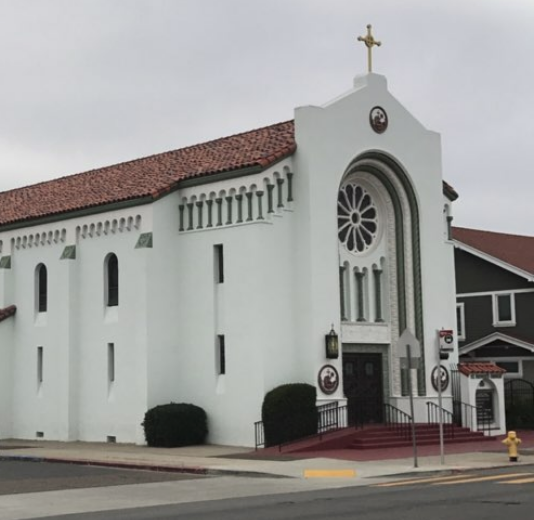Ayn Rand: Goddess of the Great Recession
(Christianity Today)
Why Christians should be wary of the late pop philosopher and her disciples.
Wallis Apologizes to Olasky after Sojourners Funding Flap
(Christianity Today)
Sojourners founder apologizes for suggesting World's editor-in-chief 'lies for a living' but stands by his organization's accepting grants from George Soros.
Dinesh D'Souza to Lead NYC's King's College
(Christianity Today)
Appointment of author and speaker prompts the questions: How Catholic is he? And how Protestant is the Campus Crusade—affiliated school?
Saved by an Atheist
(Christianity Today)
Christians gave Albert Camus good reasons not to believe. He gave me a reason to return to faith.
Are Muslims the Enemy?
(Christianity Today)
Some activists argue that the proposed mosque in New York City should move because Muslims remind us of terrorists. Plus, many defend the President's Christian faith.
Tuesday, August 31, 2010
Featured Articles
|
|
|
Monday, August 23, 2010
First-hand knowledge, not second-hand truth
Some of us remember well the day of our pressing through fully to experience, when the thing about which we had been talking for so long suddenly, by a marvelous act of the Spirit, became life in us, and we were able to say "This is THAT"! "This is that which was spoken by the prophet." There was a transition from known truth to living truth; from known doctrine to present experience; and the ringing declaration went forth - "This is THAT"!
We have all got to know that transition. We have the doctrine, and now the thing has to be quickened; made life in us, until we independently stand in the power of it. How much do you depend upon conferences and teachers to keep you going? Must you attend meetings just because you feel that the last lot you got has been used up and you must get a fresh supply? Or have you been emancipated from all human props and put into a place of glorious independence, because you KNOW YOUR GOD? It doesn't matter if you are plunged into the middle of the Sahara , you know your God and can stand independently of all natural helps - this thing has become YOU! That is the kind of knowledge that means power. That is the kind of experience which overcomes the world. That is the kind of thing that makes all the other systems go down, and you rise triumphantly above them. That was the secret of the apostolic church. Let kings do what they like, let the people rage - it goes on, and it is the Roman Empire that goes to pieces before this thing, and not this thing that goes down before the Roman Empire. It is an independent personal knowledge of God, resultant from an inward birth that lives. Not only an objective truth, but a subjective power, and it is a great day when the slightest fragment of known truth becomes a vital personal experience in its working ability. That is what we want. First-hand knowledge, not second-hand truth. May God work this into our very beings until it becomes us. Take it in fragments if you like, and ask the Lord to work it out in you and make it live in you.
From: The People That Do Exploits by T. Austin-Sparks 1927
Saturday, August 21, 2010
The Good Men Project
The Book/Documentary
The book launched on November 15, 2009, concurrently with the DVD of a documentary film of the same title, directed and produced by renowned filmmaker Matt Gannon. The book and DVD are available at Amazon.com, www.goodmenbook.org, and select independent bookshops.
Contributors to the book include Pulitzer Prize–winning journalist Charlie LeDuff and Not That You Asked essayistSteve Almond. An NFL Hall of Famer, a former Sing Sing inmate, and a Pultizer Prize–nominated photojournalist in Iraq are among the other contributors. In addition, the book includes the winning essay from The Good Men Project’s national writing contest, Perry Glasser’s Iowa Black Dirt, about a man who unexpectedly gains full custody of his 8-year-old daughter.
“This all started with the idea that men of our generation have stories to tell,” notes Good Men Project co-founder James Houghton. “And what is striking about the stories in the book is not just the breadth of experience and shared humanity that is expressed, but also the desire for so many men to talk, given our cultural bias to put on the good face and hold it all together.”
“When I shared these stories with my 13-year-old son, Seamus,” recalls The Good Men Project co-founder, Tom Matlack, “he told me that even the most hard-core essays in the book—the ones about war, sex, prison, addiction, death—cover stuff he’s already struggling to figure out. That didn’t surprise me. After Seamus read Michael Kamber’s essay about his Iraq experience, the discussion we had about Seamus’s dream to join the military went way beyond the Jason Bourne stuff we had talked about before. For the first time, we talked about what serving the country, and war, really means: the good, the bad, death, bodies torn apart. Michael’s story and our conversation dealt a decisive blow to the big-screen fantasies of war Seamus has grown up with—which are all he had in the absence of our talk. The book as a whole has given Seamus a new, honest, real way to think of his own approaching manhood.”
The Good Men Project: Real Stories from the Front Lines of Modern Manhood has gone on to become afilm/dvd, a series of live events, an online magazine and an ongoing discussion of what it means to be a man today.
A portion of the proceeds from sales of the book go to The Good Men Foundation, a not-for-profit 501(3)(c) corporation that helps fund organizations that provide educational, social, financial, and legal support to organizations that help men and boys at risk.
Thursday, August 19, 2010
Is your church the right fit for me?
August 19, 2010
Dear Pastor, Or should I call you Bishop, Apostle or Ecclesiastical Prelate? I am writing to you because I have been without a "church home" for nearly 8 years now. I am in search of a less-than-perfect church, though one with a heart for ministry and people.I am looking for more than an exclusive, religious social club, a fraternity of hallelujah brothers to meet with a couple of times a week while our communities suffer and hemorrhage and the doors of our church remain padlocked, and any ministry hopelessly confined within the church's walls.
I am in search of a church led by a pastor who is indeed a "pastor," a gentle and wise shepherd, a true servant leader. I am exhausted by my experiences in other houses of worship, admittedly embittered at times about the widespread cancer of mega-churches and yet still longing to find the church I once knew.
So I write to you amid the haze of what sometimes seems like a million churches, with as many agendas and approaches, believing that you -- the leader of your flock -- are the best barometer by which to gauge whether your church might be a right fit for me, an imperfect man and sinner in need of His grace and also of fellowship with like-minded Christians who might help him grow in this walk of faith.
So if you wouldn't mind, may I ask: Are you kind, loving and long-suffering? Or are you terse, dogmatic and rigid?
Do you see the members of your church as belonging to God or to you? Do you understand that neither they nor the church are really yours but His, and that you are not chief shepherd but merely under-shepherd to Him who has called you to feed His sheep?
Do you see the people as being servant and caretaker to the pastor rather than the pastor as being caretaker to the people -- the twistedness in today's western Christian paradigm of sheep feeding the shepherd or of shepherds feeding on the sheep?
Do you dwell in opulence or splendor whilst your members just get by, lose their jobs and homes, or live in poverty, scrounge for bus fare while you drive by in your shiny chariots and designer suits, clothed in insensitivity rather than humility and compassion?
Does the lion's share of your church's finances go to the up-building of the community in which you pastor or to the upkeep of the edifice and salaries of you and your staff?
Are you a megachurch or a mega-ministry?
When was the last time you visited the sick and shut-in? When was the last time you fed the hungry, clothed the naked, cared for the poor, showed compassion upon a stranger?
Can you remember the last time you arose from your bed in the middle of the night to be by the side of someone in crisis?
When was the last time you comforted a grieving family, spoke solemn words over their dead or stood steadfast as a leader in the community, speaking truth to power, being unyielding to political and social winds, holding fast to what is good and right, even when it is uncomfortable for you and your labor of love and sacrifice sometimes seeming thankless?
Dear pastor, are you really real? Can I touch you, speak to you without having to wade through a sea of security guards? Or must I know you only as an image glowing from a Jumbotron in the sanctuary's overflow?
Do you mince words? Or do you preach the Gospel unwaveringly, seeking to give His people the word He has commanded, so that they may be perfect and thoroughly equipped?
Are you offended by a critical but well-meaning brother, raising uncomfortable questions?
And finally, is it sufficient to simply call you "pastor"? Or does that title no longer apply?
Sincerely, John
email: jfountain@roosevelt.edu
John W. Fountain, whose column runs on Thursdays in the Sun-Times, is a professor of journalism at Roosevelt University.
Religion & How It Is Covered by the Media
Values Added: Religious Persuasions
How the press botched the story of the murdered missionaries (11:45)
Debating the strategies of gay marriage advocates (18:23)
Should Cordoba House simply be a question of law? (05:24)
Politicians fanning anti-Islam flames (07:31)
What’s behind Uganda’s anti-homosexuality bill (06:04)
Anne Rice quits Christianity, enrages Amy (05:17)
Debating the strategies of gay marriage advocates (18:23)
Should Cordoba House simply be a question of law? (05:24)
Politicians fanning anti-Islam flames (07:31)
What’s behind Uganda’s anti-homosexuality bill (06:04)
Anne Rice quits Christianity, enrages Amy (05:17)
| Play entire diavlog | |
Recorded: August 12 Posted: August 17
Posted: August 17
Tuesday, August 10, 2010
When death comes knocking
Monday, August 9, 2010 Posted by Sarah Pulliam Bailey
When news of Christopher Hitchens’ esophageal cancer first hit the news, blogs, Twitter, Facebook news feeds, there was a lot of cause for concern and several requests for prayer. Then a few people paused and said, “Wait, does Christopher Hitchens even want anyone to pray for him?”
Hitchens is, of course, author of God Is Not Great, describing himself as an antitheist. He described his feelings about the state of his health in a beautifully written piece for Vanity Fair. Towards the end of the article, he references prayer groups.
Against me is the blind, emotionless alien, cheered on by some who have long wished me ill. But on the side of my continued life is a group of brilliant and selfless physicians plus an astonishing number of prayer groups. On both of these I hope to write next time if—as my father invariably said—I am spared.
Hitchens always seems willing to take on the tough questions of life, so it seemed fitting for Anderson Cooper of CNN to ask him all sorts of questions about about his lifestyle, hedging his bets, his hope in science, people praying for him, and whether it changes his outlook on religion.
At about 5 minutes in, Cooper jumps in when Hitchens talks about bargaining with things, saying that even people who don’t believe might try to hedge their bets with God. Cooper asks who Hitchens is bargaining with, whether it’s a higher power. No, Hitchens says, though he is willing to be a guinea pig in science for cancer treatments. Of course, Cooper wants to know about the irony of people praying for someone who doesn’t believe in prayer.
Cooper: I know you know that there are people praying for you, there are prayer groups actually and you talked about that a little bit, what do you think about that, the fact that people are praying for you?
Hitchens: There are people who are praying for me to suffer and die, they have lavish websites relishing my
Cooper: Really?
Hitchens: Oh yeah. And then there are people much more numerous I must say and nicer who are praying either that I get better or that I redeem myself, that I make peace with the Almighty. That my soul gets saved even if my wretched carcass does not. And some pray for both. And in fact the 20th of September has been designated, “Everyone Pray for Hitchens Day” on one website, in case you want to mark your calendar for that. I shall not be taking part in that.
Cooper: So, you don’t pray at all?
Hitchens: No, all that’s meaningless to me. I don’t think souls or bodies can be changed by incantation. Or anything else by the way.
Cooper: So do you tell people not to do it for you?
Hitchens: No, I say if it makes you feel better, then you have my blessing.
After talking about a study about prayer and how Hitchens feels like he might let down his secular friends if he dies, Cooper asked about his approach to death.
Cooper: It’s interesting hearing you talk about it. Obviously you’re an intellectual, and you seem to be dealing with it in an intellectual way. Does that make sense? You seem to be trying to look at this as rationally as possible. What about the emotional side?
Hitchens: Let’s say objectively. I’m not by any means tear-proof. I haven’t wept at any point yet. Maybe that’s to come. But I’ve become moist when I think about my children, for whom its a nasty shock. Incidentally, whatever God is punishing me, according to the other prayer faction, is punishing them, too. I don’t know if they think about that.
Because the question comes after asking about prayer groups, Cooper’s question comes across as a bit condescending towards religious people in comparison. It’s not as though people of faith lose intellectual rigor when they approach death, right? Anyway, Cooper wanted to discuss the prayer groups again. It seemed like Cooper was fishing for a more frustrating reaction, but Hitchens had already told Hugh Hewitt that he was touched by the thought.
Cooper: One more thing about the prayer group, do you appreciate the gesture?
Hitchens: Oh, yes. Often it comes from people I’ve debated with in the past in their churches or synagogues, people who find me a very fierce antagonist and think that in some way some bits of me are worth saving. I take that kindly, of course. I wouldn’t want to be churlish about any expression of concern. But I can’t keep but keep the pitying tone in my voice that anyone would think that the natural order containing as much mystery … could be altered by incantation.
Cooper ends the interview by asking Hitchens whether he’s sure he doesn’t want to hedge his bets. Hitchens says that while “the faithful love to spread these rumors” that on his death bed he converts, he said he would do no such while he’s lucid. If there are any rumors saying otherwise, he said, “Don’t believe it.”
Generally, Cooper did a nice job with the interview, asking about whether Hitchens’ views have changed, how he responds to the religious responses, what it feels like to be in his situation. Jeffrey Goldberg of the Atlantic also spoke with Hitchens about similar topics, but the CNN interview flows a little more smoothly.
One angle either interviewers could have dealt with was how Hitchens approaches the idea of the afterlife. So while religious people tend to offer an another life after death (heaven, reincarnation, what have you), its raises questions about what happens when an atheist, agnostic, or nonreligious person faces death. Has his view of the afterlife changed at all since facing death much sooner then he expected?
Another question someone could ask him is whether he has communicated with his brother Peter, who recently published an American edition of The Rage Against God, a Christian counter his brother’s book. Mark Opennheimer recently wrote that Peter is “obviously sad,” so does his cancer change their relationship at all?
It would also be interesting to see how Hitchens compares himself with other famous atheists, such as Bertrand Russell (who once mentioned what he would ask God if he met him) or Anthony Flew (who famously became a deist before he died earlier this year).
CNN gave a decent, fairly generic interview, but I’ll be curious to see if Hitchens could answer a few more probing questions in the months to come.
Saturday, August 7, 2010
Worship among the First Christians
T. M. Moore
Saturday August 7, 2010
What then, brothers? When you come together, each one has a hymn, a lesson, a revelation, a tongue, or an interpretation. Let all things be done for building up. -1 Corinthians 14:26
The Teaching of the Twelve
Anonymous (late first or early second century)
“Thou, Almighty Lord, didst create all things for thy name’s sake, and gavest meat and drink for men to enjoy, that they might give thanks unto thee, and to us didst vouchsafe spiritual meat and drink and life eternal, through thy son. Above all we thank thee because thou art mighty. Glory be to thee forever. Remember, Lord, thy Church, to deliver her from all evil, and to perfect her in thy love, and gather together from the four winds her that is sanctified into thy kingdom which thou didst prepare for her. For thine is the power and the glory for ever. Let grace come, and let this world pass away.”
In this template prayer the writer of The Didache continues to reveal something of the soul of early Christian worship. See the emphasis, again, on the oneness of the Body of Christ, as well as on growing in the Lord through Jesus Christ, being purified from wickedness and worldliness, and being about the business of mission. This is how God is glorified through His Church, and it is appropriate to drape our prayers in worship around such themes.
What kind of templates guide the prayers offered in your church’s worship? Do they reflect the kind of emphasis we see in the first Christians?
Saturday August 7, 2010
What then, brothers? When you come together, each one has a hymn, a lesson, a revelation, a tongue, or an interpretation. Let all things be done for building up. -1 Corinthians 14:26
The Teaching of the Twelve
Anonymous (late first or early second century)
“Thou, Almighty Lord, didst create all things for thy name’s sake, and gavest meat and drink for men to enjoy, that they might give thanks unto thee, and to us didst vouchsafe spiritual meat and drink and life eternal, through thy son. Above all we thank thee because thou art mighty. Glory be to thee forever. Remember, Lord, thy Church, to deliver her from all evil, and to perfect her in thy love, and gather together from the four winds her that is sanctified into thy kingdom which thou didst prepare for her. For thine is the power and the glory for ever. Let grace come, and let this world pass away.”
In this template prayer the writer of The Didache continues to reveal something of the soul of early Christian worship. See the emphasis, again, on the oneness of the Body of Christ, as well as on growing in the Lord through Jesus Christ, being purified from wickedness and worldliness, and being about the business of mission. This is how God is glorified through His Church, and it is appropriate to drape our prayers in worship around such themes.
What kind of templates guide the prayers offered in your church’s worship? Do they reflect the kind of emphasis we see in the first Christians?
Tuesday, August 3, 2010
The Need of the Hour by T. Austin-Sparks
Where there is no revelation, the people cast off restraint... (Proverbs 29:18).
No one who knows anything about the present conditions will disagree with the statement that the Church is in tragic need of men with a message, but our point is that what is needed is the knowledge of what the message is for the time. That message must come from God to men chosen for the purpose. This is not a ministry which can be taken up. Usually for such ministry there is a long and deep history with God, a history full of mystery and suffering. Many phases are passed through, all in the permissive will of God, or in His directive will, inasmuch as they are intended to educate and give experience, but the course is never that of the established and settled kind, and so big changes may be called for, each of which comes by a new spiritual crisis. No one can do anything in the making of such vessels, however much they may be concerned for them. This is God's work alone, and they have to be left in His hands...
Men of vision and courage! Yes, and more courage will be required here than in any other realm of which we know. A specific revelation will - to begin with - set a distance between such as have it and such as have not that specific revelation. This will give rise to many possibilities. Even the best servants of God who have not so seen will probably stand back. It will mean loneliness, and going on alone perhaps for quite a time. It will mean ostracism, misunderstanding, misrepresentation, suspicion, closed doors (so far as man can close them). Then, no revelation from God is ever just verbal truth, it always involves practical issues. These practical issues will appear like the crystallising of the truth, so that those who obey it will become marked people. This raises a new set of opposing elements. If God has given a revelation concerning His purpose in Christ which is of such vital importance as to have called for all this special history and preparation, we must realise that it is of very great moment to Satan's interests, and he will leave nothing unused to make its course impossible... If the greatest need of the hour is that of men of vision, along with it will go the need for willingness to pay the price. But there is another side, and that is God's side, and the compensations are great. It is a great thing to be in possession of an open heaven and of a mandate from God.
From: The Need of the Hour
First published in "A Witness and A Testimony" magazine, Jul-Aug 1938
Monday, August 2, 2010
The deadliest Pharisaism today
The deadliest Pharisaism today is not hypocrisy
but unconscious unreality.
My Utmost For His Highest, March 16, Oswald Chambers (English-English)
The deadliest attitude of the Pharisees that we
exhibit today is not hypocrisy but that which comes from unconsciously living a lie.
My Utmost For His Highest, March 16, Oswald Chambers (American-English)
Pharisaism also Phariseeism The doctrines and practices of the Pharisees.
Hypocritical observance of the letter of religious or moral law without regard for the spirit; sanctimoniousness.
Pharisee A member of an ancient Jewish sect that emphasized strict interpretation and observance of the Mosaic law
in both its oral and written form.
A hypocritically self-righteous person.
First Apology
Justin Martyr (ca 100-165)
“Sunday, indeed, is the day on which we all hold our common assembly, inasmuch as it is the first day on which God, transforming the darkness and matter, created the universe; and on the same day our Saviour Jesus Christ rose from the dead. For they crucified Him on the day before Saturday; and on the day after, which is Sunday, He appeared to His apostles and disciples, and taught them these things which we have transmitted to you also for your earnest consideration.”
Sunday was considered the day of new beginnings by the early Christians. They moved their worship to that day in order to capture both God’s original design for the world and His redemptive work in our Lord Jesus Christ. Thus, obviously, the focus of Sunday for the first Christians was on the Lord and His creating and re-creating power. This also comports with God’s purpose in giving a day of rest to His people in Exodus 20:11.
How does your church encourage its members to use Sunday as a day for focusing entirely on the Lord’s creative and re-creative power and promise?
“Sunday, indeed, is the day on which we all hold our common assembly, inasmuch as it is the first day on which God, transforming the darkness and matter, created the universe; and on the same day our Saviour Jesus Christ rose from the dead. For they crucified Him on the day before Saturday; and on the day after, which is Sunday, He appeared to His apostles and disciples, and taught them these things which we have transmitted to you also for your earnest consideration.”
Sunday was considered the day of new beginnings by the early Christians. They moved their worship to that day in order to capture both God’s original design for the world and His redemptive work in our Lord Jesus Christ. Thus, obviously, the focus of Sunday for the first Christians was on the Lord and His creating and re-creating power. This also comports with God’s purpose in giving a day of rest to His people in Exodus 20:11.
How does your church encourage its members to use Sunday as a day for focusing entirely on the Lord’s creative and re-creative power and promise?
Subscribe to:
Posts (Atom)



















